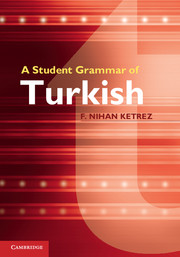Book contents
- Frontmatter
- Contents
- Acknowledgments
- Conventions used in the book
- Chapter 1 Introduction
- Chapter 2 The sounds of Turkish
- Chapter 3 The noun: an overview
- Chapter 4 Case markers
- Chapter 5 Genitive and possessive
- Chapter 6 Numerals and plurality
- Chapter 7 Existential var / yok
- Chapter 8 Pronouns
- Chapter 9 The verb: an overview
- Chapter 10 -Iyor, the progressive
- Chapter 11 Future with -(y)AcAK
- Chapter 12 Past with -DI and -(y)DI
- Chapter 13 -mIş and -(y)mIş
- Chapter 14 Present tense with the aorist -Ir/-Ar
- Chapter 15 -mAktA and -DIr
- Chapter 16 Imperative and optative
- Chapter 17 Compound tenses
- Chapter 18 Person markers
- Chapter 19 Postpositions
- Chapter 20 Passive
- Chapter 21 Causative
- Chapter 22 Reflexive
- Chapter 23 Reciprocal
- Chapter 24 Subordination
- Chapter 25 Infinitives with -mA and -mAK
- Chapter 26 Adjectives
- Chapter 27 Adverbials
- Chapter 28 Conditional
- Chapter 29 Ability and possibility with -(y)Abil
- Chapter 30 Obligation and necessity
- Chapter 31 Relative clauses
- Chapter 32 Word order
- Chapter 33 Questions
- Chapter 34 Negation
- Chapter 35 Coordination
- Chapter 36 Diminutive
- Chapter 37 Reduplication
- Chapter 38 Interjections and some idiomatic expressions
- Chapter 39 Spelling and punctuation
- Chapter 40 Conversation
- Appendix A Verbal inflection paradigms
- Appendix B Nominal inflection paradigms
- Appendix C Verbs categorized according to their case-marked complements
- Appendix D Verbs categorized according to their clausal complement types
- Appendix E Selected grammar books for further study
- Appendix F Answer key to the exercises
- Appendix G Glossary of grammatical terms
- Index
Chapter 31 - Relative clauses
Published online by Cambridge University Press: 05 June 2012
- Frontmatter
- Contents
- Acknowledgments
- Conventions used in the book
- Chapter 1 Introduction
- Chapter 2 The sounds of Turkish
- Chapter 3 The noun: an overview
- Chapter 4 Case markers
- Chapter 5 Genitive and possessive
- Chapter 6 Numerals and plurality
- Chapter 7 Existential var / yok
- Chapter 8 Pronouns
- Chapter 9 The verb: an overview
- Chapter 10 -Iyor, the progressive
- Chapter 11 Future with -(y)AcAK
- Chapter 12 Past with -DI and -(y)DI
- Chapter 13 -mIş and -(y)mIş
- Chapter 14 Present tense with the aorist -Ir/-Ar
- Chapter 15 -mAktA and -DIr
- Chapter 16 Imperative and optative
- Chapter 17 Compound tenses
- Chapter 18 Person markers
- Chapter 19 Postpositions
- Chapter 20 Passive
- Chapter 21 Causative
- Chapter 22 Reflexive
- Chapter 23 Reciprocal
- Chapter 24 Subordination
- Chapter 25 Infinitives with -mA and -mAK
- Chapter 26 Adjectives
- Chapter 27 Adverbials
- Chapter 28 Conditional
- Chapter 29 Ability and possibility with -(y)Abil
- Chapter 30 Obligation and necessity
- Chapter 31 Relative clauses
- Chapter 32 Word order
- Chapter 33 Questions
- Chapter 34 Negation
- Chapter 35 Coordination
- Chapter 36 Diminutive
- Chapter 37 Reduplication
- Chapter 38 Interjections and some idiomatic expressions
- Chapter 39 Spelling and punctuation
- Chapter 40 Conversation
- Appendix A Verbal inflection paradigms
- Appendix B Nominal inflection paradigms
- Appendix C Verbs categorized according to their case-marked complements
- Appendix D Verbs categorized according to their clausal complement types
- Appendix E Selected grammar books for further study
- Appendix F Answer key to the exercises
- Appendix G Glossary of grammatical terms
- Index
Summary
Relative clauses are complex clauses that have a modifier function. In the following examples, the clauses between the brackets modify the nouns that come after them.
[Dün akşam izle-diğ-imiz] filmi beğendin mi?
‘Did you like the film [that we watched last night]?’
[Babamı ara-yan] hanım kimmiş?
‘Who is the lady [that called my father]?’
En sev-diğ-im dizi bu akşam saat dokuzda.
‘The TV series [that I like the most] is at nine tonight.’
Note that the relative clauses precede the nouns that they modify, just like the adjectives. In that sense they contrast with the counterparts in English. Another difference between English and Turkish relative clauses is that Turkish does not have a complementizer such as ‘that, what, who, where’ in its relative clauses. Rather, relative clauses are formed with -DIK, -(y)AcAK, and -(y)An that are attached to the verbs of the clauses. -DIK and -(y)AcAK are followed by a possessive marker that marks the subject of the relative clause. No possessive markers are used after -(y)An.
izle-diğ-imiz film
watch-DIK-possessive-1plural
‘film that we watch(ed)’
Türkçe konuş-an adam
Turkish speak-(y)An man
‘Turkish-speaking man’
- Type
- Chapter
- Information
- A Student Grammar of Turkish , pp. 221 - 231Publisher: Cambridge University PressPrint publication year: 2012



